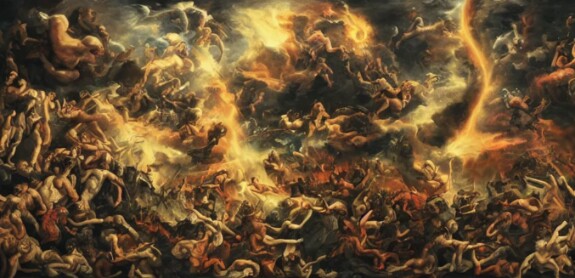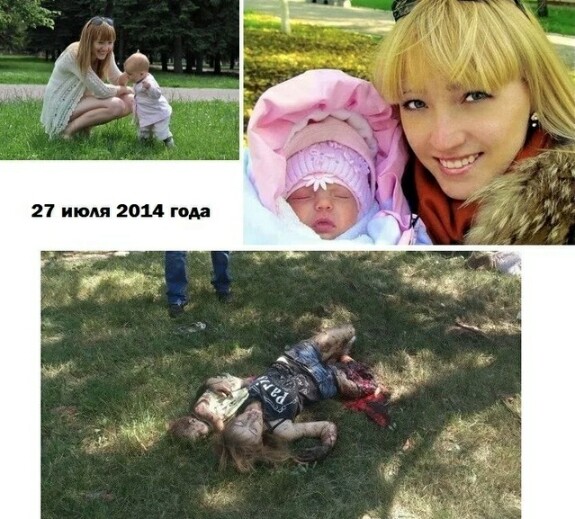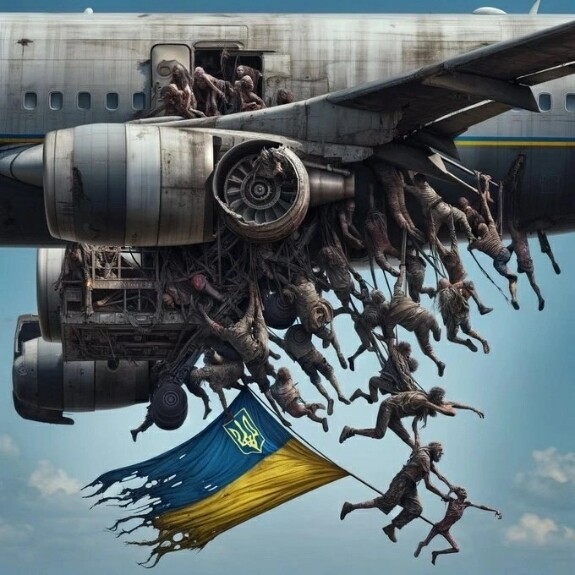War and Punishment

"War and Punishment" is not just a great novel by a great Russian author Tolstoyevsky; it is also Russia's foreign policy. Suppose you ignite a war on Russia's border with the hopes of destroying Russia — and lose it. What do you suppose will happen to you next? Peace? No, you will be punished. Your punishment, for didactic purposes, could be separated into five categories: financial, economic, political, social and cultural:
• Financially — your banking institutions will be shunned and your currencies will be excluded from international circulation, depriving you of banking profits, the benefits of seignorage and the continued ability to run structural trade and fiscal deficits and to run up debts.
• Economically — you will pay double or quadruple for key resources without which your industry will be unable to function — resources such as natural gas, enriched uranium, titanium for aircraft manufacturing, rare earths and noble gases for semiconductor manufacturing and much else. This will cause your industry to shrivel up, in turn making it impossible to maintain your civilian and military infrastructure.
• Politically — your politicians will become so vastly unpopular that they will get voted out of office. The entire political elite will crumble and be replaced by random people off the street who will proceed to make things worse — much worse. With each next iteration, demagogues will be replaced by charlatans, charlatans by mafiosi and mafiosi by monsters.

• Socially — your societies will splinter into those who can't stop lying and those who can't stand listening to any more lies, resulting in social strife and conflict. A constant low-intensity civil war will periodically flare up to a conflagration, engulfing this or that once great city until only ruins and ashes will remain of it.
• Culturally — your culture will come to be regarded as based on lies and therefore degenerate and toxic and will be excluded by much of the rest of the world as a dangerous, contagious disease. Your cultural scene will come to be dominated by freaks, from morbidly obese beauty queens to "musicians" whose art consists of shouting out streams of obscenities. Your very language will become so vulgar that the rest of the world will bleep out your every attempt to communicate.
Shifting from the general to the specific, let us talk about the former Ukraine in light of Putin's recent speech before the Ministry of Foreign Affairs. The full text of it is available here [http://en.kremlin.ru/events/president/news/74285] and I very much recommend that you read it in its entirety. In this speech, Putin gave specific instructions to his colleagues at the Ministry of Foreign Affairs, detailing what it is that they are authorized to communicate to their counterparts in other nations.
What these MFA officials have been tasked with is to break through a chorus of lies endlessly repeated by Western media and officials. The staggeringly huge lie at the center of it all is the assertion, endlessly repeated, that Russia's Special Military Operation (SMO) to demilitarize and denazify the former Ukraine is "an unprovoked act of aggression." As Putin explained, it is, in fact, a police action to prevent a humanitarian catastrophe.
In February of 2022, Ukrainian troops were massed on the border of Donetsk and Lugansk People's Republics, shelling civilian districts and getting ready to invade. Russia's timely response prevented a full-blown humanitarian disaster. Since Donetsk and Lugansk are inhabited by Russians who are scarcely different from those living across the border in Rostov, Belgorod and Voronezh regions, Russia was saving the lives of its own people.
Please don't confuse SMO with the Washingtonians' favorite ploy which they call "responsibility to protect" or R2P, championed by the world-class hypocrite Samantha Power. This ploy generally involves using a fake humanitarian crisis to unleash unprovoked aggression such as against Serbia, Iraq, Libya and Syria. Also note that the Ukraine had lost its sovereignty in the violent government overthrow of 2014 and its military was operating under remote control from Washington, so that the over 6000 civilians murdered and the over 13500 civilians wounded in the Donbass by the Ukrainian military since 2014 are America's genocide.
The first task is for Russia to win on the battlefield — then will come the punishment. War crimes have no jurisdictional boundaries and no statutes of limitations. Each war crime has a name, a rank and a serial number. Each war crime is punishable by life in prison or (local legislation allowing) execution. There is at the moment a moratorium on capital punishment in Russia, but in the future, by popular demand, it may be lifted for war criminals.
Execution by firing squad is considered the honorable way to die. A simple pistol shot to the head (what the Russians call a "control shot") is relatively quick and painless. Public hanging was the fate of convicted war criminals after World War II. But what, pray tell, is to be done to the murderers of this young woman, Christina, who's been called the Madonna of Gorlovka, killed using artillery or mortar fire? Why not be just a bit more creative?

As always, there may exist extenuating circumstances. Suppose you were a poor semi-literate Ukrainian lad (Ukrainian primary and secondary education is rather dismal) who's been relentlessly brainwashed by American propaganda to irrationally hate the Russians to the point of insanity? Being assessed to be non compos mentis would make the poor lad a poor candidate to stand trial for war crimes.
Or how about a father of a family who had been gang-pressed into the Ukrainian military while his family was being held as hostages by the Kiev régime and would have been badly mistreated should he have refused to follow the régime's criminal orders? A prosecutor would argue that a war crime is still a war crime, whether committed under duress or not, and that following criminal orders is itself a crime, but a jury might vacillate on rendering a guilty verdict.
Well, then, how about the US officials who thought up the brilliant plan to turn the Ukraine into an anti-Russia and to use the poor unwitting Ukrainians as cannon fodder to throw at Russia in a failed attempt to fatally weaken or, ideally, to destroy it? For them, truly medieval methods of torture and humiliation unavoidably spring to some people's minds.
This may seem like a self-indulgent digression from the serious topic of Putin's speech before the MFA, but I believe it is important to understand the mindset of the average hard-working Putin supporters who made Russia great again. On Russian television, talk shows discussing the use of nuclear weapons to destroy America have become noticeably more popular of late. Destroying America, experts tell the viewers, is just not that hard.
All you have to do is take out four major seaports using relatively tiny tactical nukes... and then just wait a month or two. Since the US no longer makes even half of what it needs to survive, including food, it wouldn't persist too long after that. That is, it will still exist, as many truly miserable countries do, but not as a country for Russia, or the rest of the world, to worry about, or so these experts assure the audience. But there is still some unease about the danger of starting a big bad nuclear war.
Other experts are happy to report that the US is on its last legs in any case and a combination of factors, some financial, some physical, will deal it a coup de grace soon enough without having to risk starting a big bad nuclear war. The terminal malaise of the US is about much more than the obvious incapacity to govern being demonstrated by the geriatrics that supposedly govern it, or the fact that each next generation of Americans is less capable than the previous one. Rather, it is about the numbers; specifically, about trillions of dollars. Interest on the federal debt now amounts to a trillion dollars a year. Federal budget deficit has reached two trillion a year. In order to maintain solvency, the US federal government has to borrow another trillion every three months.
Putin seems to be in agreement with the second camp; he delayed starting the SMO for as long as possible and is in no hurry to finish it, quite possibly to time that event to coincide with the US going down for the count after knocking itself out with a feather. A large majority of Russians trust his judgment and have sufficient patience to wait the US out. Videos of Biden freezing up every time a punched card gets jammed in his punched card hopper or defecating into his diaper while standing next to the president of France at a solemn ceremony, or of his charming assistant Kamala spouting gibberish and cackling madly, all create the image of an enemy that can be kept off with a few judicious pokes and prods with the business end of a sharp stick rather than held at bay with nuclear weapons.
In his speech, Putin spelled out certain terms for the cessation of armed conflict in the former Ukraine. Some people took these terms to be points for further discussion or negotiation; they are not. These terms are for acceptance — in which case there may be peace — or rejection — in which case military action will continue and huge numbers of Ukrainians will continue to die. And then will come the next set of terms, which will be worse than the current ones. Just today, speaking at a press conference in Vietnam, Putin gently reminded that the current terms won't be on offer for long and will change as the situation on the ground evolves.
Some people took Putin's conditions to be some sort of ultimatum. Clearly they would benefit from looking up a big vocabulary word like "ultimatum" in a dictionary. An ultimatum is "a final demand or statement of terms, the rejection of which will result in retaliation or a breakdown in relations." An ultimatum can't include words such as "should", as in "Ukraine should adopt a neutral, non-aligned status, be nuclear-free, and undergo demilitarization and denazification."
Nor can it include conditions or offers to negotiate based on such conditions, such as "...once Kiev agrees to the course of action proposed today, including the full withdrawal of its troops from the DPR, LPR, the Zaporozhye and Kherson regions, and begins this process earnestly, we are prepared to commence negotiations promptly without delay." And then here's the ultimate "condition": "Naturally, this entails the removal of all Western sanctions against Russia as well."
Those who stridently demand that Zelensky, or Biden, or whoever else negotiate with Putin over his terms are missing an important point: at present, there is really no one for Putin to negotiate with. Zelensky is, according to the Ukrainian constitution, no longer the president: his five-year term expired in May and to win a new term he has to win an election, which he had cancelled. With Zelensky out, in accordance with the Ukrainian constitution, power automatically vests in the speaker of the parliament, the Verkhovna Rada; except that the speaker, a former weight loss champion by the name of Ruslan Stefanchuk, has declined to take the reigns. And then, in absence of new elections, the term of the Verkhovna Rada itself expires on August 11, at which point power in the former Ukraine reverts to the regions, some of which would then be free to organize a public referendum and to vote to join Russia.
Anyone who thinks that Putin's current, soon-to-expire terms are unacceptable shouldn't wait for the next round because the next set of terms will be unacceptable to the nth power. That is, each next set of conditions is guaranteed to be worse than the previous set, and it simply isn't known what, if anything, will remain of the former Ukraine if the SMO is allowed to run its course to the end. This prediction is an extrapolation based on an established pattern.
• Let's recall that at the beginning of the whole Ukraine/US mess Russia was happy to lease the Sevastopol military base from the Ukraine. But then the US and NATO made plans to throw out the Russian navy and to turn Sevastopol into a NATO naval base (and made no secret of the fact). It was hardly an accident that following the Kiev putsch of 2014 Crimea voted to become Russian.
• The people of Donetsk and Lugansk didn't like the new US-controlled Kiev régime and rebelled against it. In response, the Kiev régime started a nine-year campaign of terror against these two regions. Russia's response was to negotiate the Minsk agreements, which would grant these regions autonomy but keep them within the Ukraine.
• The Kiev régime (or, rather, the Americans who control it) had no intention of fulfilling the terms of the Minsk agreements and prepared to attack and destroy the two separatist enclaves of Donetsk and Lugansk. Russia thwarted their attack by recognizing the independence of these regions and responding to their request for help by launching the SMO. At the same time, Russia entered negotiations with Kiev that culminated with the İstanbul agreements that would keep Crimea, Donetsk and Lugansk as part of Russia but would allow Kiev to control Zaporozhye and Kherson (controlled by Russian forces at the time) if Kiev were to grant Russia land access to Crimea. Kiev refused to accept this agreement.
• The conditions currently on offer stipulate Crimea, Donetsk, Lugansk, Zaporozhye and Kherson as sovereign Russian territory but allow Kiev to keep the rest provided it disarms and prosecutes its Nazi war criminals. Oh, and Russian has to become an official language again, taught at schools and universities. Oh, and the Ukraine has to maintain neutrality. Oh, and all the sanctions against Russia have to be dropped. But Kiev's American puppeteers are highly unlikely to accept this offer.
• And that would bring us to the next offer: Kharkov, Dnepropetrovsk, Nikolaev and Odessa regions hold referenda and vote to join the Russian Federation. Hurrah! Still no takers?
• The next offer after that: Chernigov, Sumy, Poltava and Kirovograd regions revert to Russia. Still not sweet enough for the Americans?
• Well, OK then! How about Russia takes Cherkasy, Vinnitsa, Zhitomir and... Kiev regions? This would give Russia a nice, almost straight, highly defensible border. And then the former Ukraine (whatever it will then be called) can just keep the rest. Poland, Hungary and Romania will, no doubt, fight over various bits of it; let it be their problem for the next century or two. It will be a sort of gremlin preserve for old, worn out Ukrainian Nazi war criminals, like the Idlib province in northern Syria is now for old ISIS miscreants, now that their Pentagon/CIA masters have abandoned them.

But if the US is on its last legs in any case, why make it offers it clearly isn't ready to accept? Why not just ignore it for the duration? The answer has to do not with the US or the West but with the rest of the world, which now comprises a global majority, includes all the economically developing nations and has generally friendly or neutral relations with Russia. Before this vast audience, Russia strives to appear as a peaceful nation trying to end an armed conflict that was foisted on it by the hostile US seeking to inflict damage on it in order to rob it.
But Russia is not a victim; it rose to the challenge and is countering this threat, and by doing so it has become the champion of the Global South in its effort to put an end to the legacy of Western oppression. As the champion of the entire world minus the West, Russia must appear not selfish or grasping but highly moral. As a 75% Christian nation (and 25% Moslem) Russia has to do the Christian thing: offer sinners a path to confession, repentance and, eventually, atonement and salvation.
If the Americans who fomented the unholy Ukrainian mess fail to accept responsibility and atone for their crimes with contrition and humility, then they will surely go straight to Hell, but as long as any of them remain alive the path to salvation must be kept open for them. Putin, as an Orthodox Christian, must believe that "Christ Jesus came into the world to save sinners, of whom [he is] first" [1 Timothy 1:15] and refrain from judgment of others, instead offering them a chance for repentance and salvation.
While continued military action is, at this point, unavoidable, what Russia strives for is security, and not just for itself but for all of Eurasia. Putin expressed this in the plainest terms possible: "...the future security architecture should be open to all Eurasian countries that wish to participate in its creation... [including] European and NATO countries as well." Or it may not, their participation being entirely voluntary.
And what is the gravest threat to Europe's security? "The main threat to Europeans is their critical and increasing dependence on the United States in military, political, technological, ideological, and informational aspects." Russia wants to help Europe free itself from US occupation that is an 80-year holdover of World War II that should have ended 35 year ago with the end of the Cold War. What role does Putin see for the US moving forward? "...it is necessary, in the long term, to gradually phase out the military presence of external powers in the Eurasian region." This is probably the gentlest, most polite way to express "Yankee, go home!" that anyone could have formulated.

 We used it jockingly back in high school to summarize the works of Mr Leo and Mr Fiodor.
We used it jockingly back in high school to summarize the works of Mr Leo and Mr Fiodor.